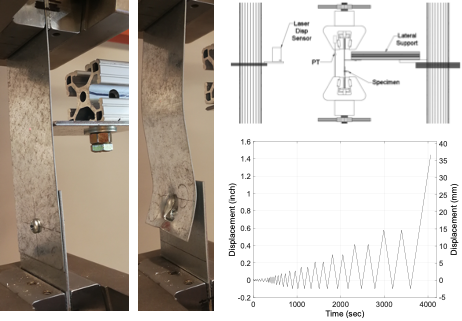Johns Hopkins University Thin-walled group researchers Zhidong Zhang and Ben Schafer released a test report today investigating the fastener-level force-deformation response appropriate for cold-formed steel (CFS) framed steel sheet sheathed shear walls under cyclic loads. A total of 156 tests were completed in a lap shear testing configuration. The work is intended to provide critical missing information for CFS-framed steel sheet sheathed shear walls in the simulation and design.
Report abstract: This report provides fastener-level force-deformation response appropriate for cold-formed steel (CFS) framed steel sheet sheathed shear walls under cyclic loads. A key feature of the fastened connection is the impact of the steel sheet shear buckling on the local fastener-level response. Recent CFS shear wall tests employing thin steel sheets screw fastened to cold-formed steel framing have examined the impact of thicker and stiffer boundary framing, double steel sheet sheathing, and sandwiching the steel sheet between boundary members – all demonstrating the potential for higher capacity and ductility for steel sheet sheathed CFS-framed shear walls. For the seismic performance of screw fastened, steel sheet sheathed shear walls, the cyclic nonlinear response of the fastener connection is particularly important and should incorporate the impact of the steel sheet local buckling on the strength and ductility of theconnection. Minimal cyclic fastener-level shear test data exists, especially for combinations of screw fastened thin steel sheet and thick framing steel. A lap shear testing configuration, featuring either one thin steel sheet ply and one thick framing ply or one thin steel sheet ply and two thick framing plies connected by a single fastener withappropriate sensors is designed. The lap shear tests follow the AISI S905 test standard and are augmented for this particular configuration including adding asymmetric loading cycles following a modified FEMA 461 loading protocol. The asymmetric cyclic loading protocol is selected with a small displacement applied in the direction which buckles the thin steel sheet followed by progressively larger displacements in the opposite direction. A total of 156 tests, covering a wide range of framing thickness, sheet thickness, fastener type and size, and loading types are conducted. Key statistics from each test, including characterization with a multilinear backbone curve are provided. The testing is intended to provide critical missing information for the design and simulation of CFS-framed steel sheet sheathed shear walls.
Download the report: https://jscholarship.library.jhu.edu/handle/1774.2/62850
